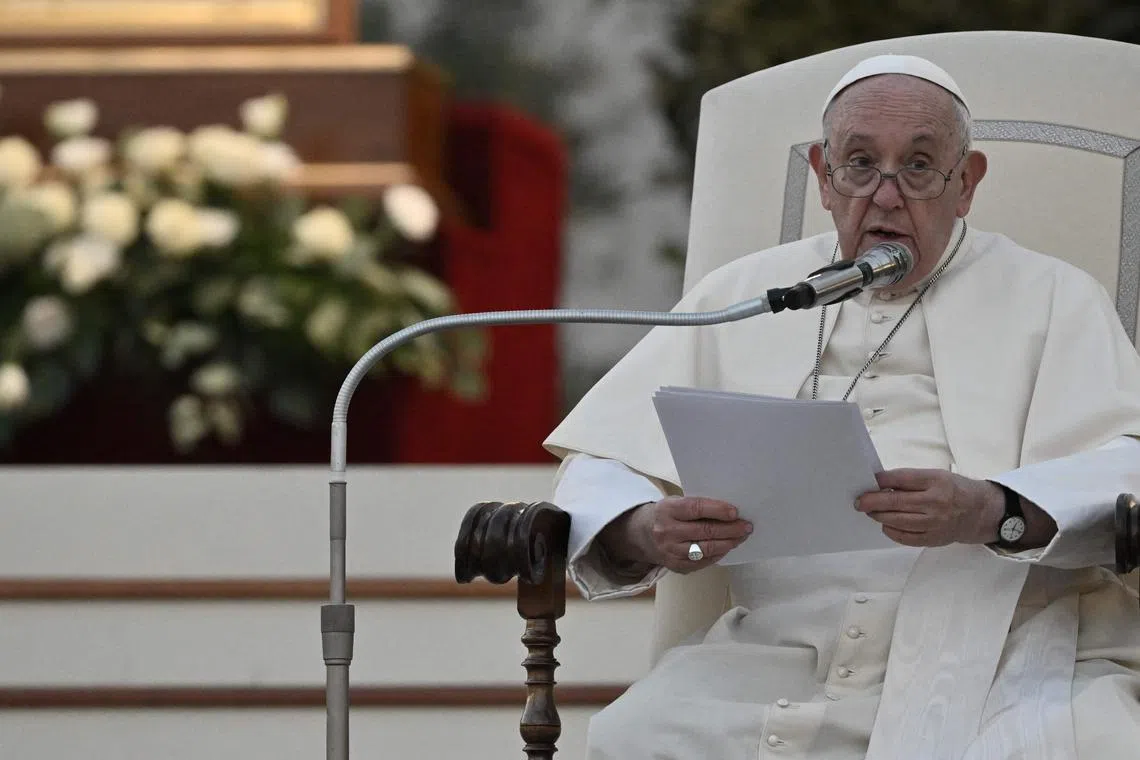Conservatives challenge Pope on women, same-sex couples before Vatican meeting
Sign up now: Get ST's newsletters delivered to your inbox

Five cardinals from Asia, Europe, Africa, the US and Latin America said they sent Pope Francis a set of formal questions about the gathering.
PHOTO: AFP
VATICAN CITY – Conservative Catholics have launched a barrage of challenges before a big Vatican meeting, with five cardinals demanding clarifications on same-sex couples and other issues and a women’s group saying only men should vote at the event.
The cardinals from Asia, Europe, Africa, the United States and Latin America said on Monday that they sent Pope Francis a set of formal questions, known as “dubia” (doubts in Latin), about the gathering.
In an open letter to Catholics, they said they announced their challenges “so that you may not be subject to confusion, error and discouragement but rather may pray for the universal Church”.
The Vatican said it had no comment on the cardinals’ action – the latest clash between the Pope and minority conservatives, who have accused him of undermining a number of traditional precepts.
Church leaders have been preparing for this week’s closed-door meeting
Topics will include the role of women, greater acceptance of LGBT (lesbian, gay, bisexual and transgender) Catholics, social justice and the effects of climate change on the poor.
At the meeting, around 365 “members”, including cardinals, bishops, lay people and, for the first time, women will vote on proposals.
Discussions will run till September and resume in October 2024. A papal document will follow, most likely in 2025, meaning changes in Church teaching, if any, would be a long way off.
The five cardinals – all well-known critics of the Pope who range in age from 75 to 90 and no longer hold any major office – are Cardinal Raymond Burke of the United States, Cardinal Walter Brandmueller of Germany, Cardinal Joseph Zen of Hong Kong, Cardinal Robert Sarah of Guinea and Cardinal Juan Sandoval Iniguez of Mexico.
There are 242 cardinals in the Church, and it was not clear if the five asked any others to join. One well-known critic of Pope Francis, German Cardinal Gerhard Mueller, was not among the signatories.
Cardinal Burke told National Catholic Register, a conservative publication, the cardinals sent the Pope an earlier set of questions, and he responded a day after receiving them in July.
Not satisfied, they reformulated and resubmitted them to elicit a simple yes or no answer. The Register said the Pope has not yet responded.
One question asked if same-sex couples could receive blessings, which some priests have done in a number of countries, notably Germany, even though the Vatican ruled against such blessings in 2021.
The cardinals said they wanted a clear reaffirmation of the Church’s teaching that homosexual acts are sinful.
They also sought more clarity on the Church’s ban on women priests, even though Pope Francis, citing a 1994 ruling by Saint Pope John Paul II, has already said the “door is closed” on that issue.
Proponents of the synod, including many cardinals and bishops, have welcomed the consultations as an opportunity to change the Church’s power dynamics and give a greater voice to lay Catholics, including women, the LGBT community and people on the margins of society.
Conservatives have taken issue with the fact that many lay people will have voting rights in a what is formally a Synod of Bishops. They say the Church should remain a male-dominated hierarchical structure where authority, particularly on doctrine, should flow from the top.
Last week, women in the conservative United States-based group Restore Tradition decried the fact women were given a vote at the meeting equal to that of a cardinal or bishop, saying some women advocated “heretical doctrines” against tradition.
“We wish to be represented only by bishops,” the group said, citing “divine law” that only men could receive sacramental ordination.
The international conservative group, “Tradition, Family and Property,” sent participants a 100-page booklet calling the gathering a dangerous “Pandora’s Box”.
In the foreword, Cardinal Burke said he fears the synod will sow “confusion and error and division”. REUTERS


